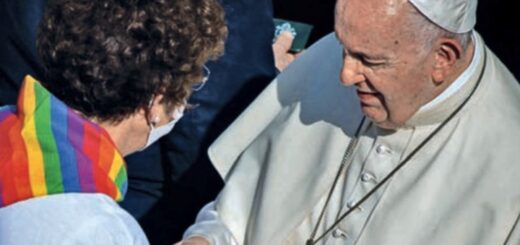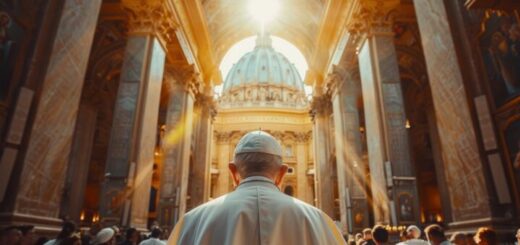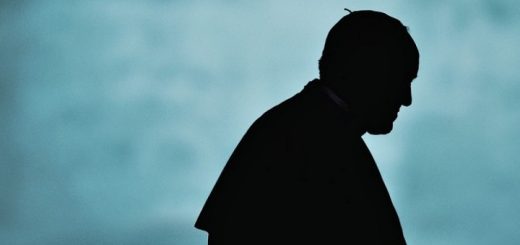It's not all rosy here. Michael and the gay Nigerian refugee community in New York
Article by Lisa De Bode published on the Al Jazeera America website (United States) on 5 March 2014, freely translated by Giacomo Tessaro
Michael Ighodaro slowly rises to his feet with bloodshot eyes scanning the venue intently for support. This HIV-positive young man is a regular presence at these meetings: he works with the LGBT community in New York in the field of AIDS information. Tonight he wants to invite participants to an international protest against Nigeria's anti-homosexuality laws: the audience's reactions are encouraging. “We want the world to know what is happening in Nigeria, to realize that it is a very serious matter and that they should do something” says Michael, 27. In his home country, participating in such a protest would cost him 10 years in prison, assuming he is not killed.
Last January, Nigerian President Goodluck Jonathan signed a law making same-sex relationships and LGBT activism illegal. Dozens of people were arrested, many were beaten and some killed by angry mobs. More and more cases of extortion and assault of homosexuals by the police and others are being reported “neighborhood vigilantes” (as Kent Klindera, director of amfAR, a foundation that deals with AIDS research and supports Nigerian communities in the fight against HIV, calls them), who try to purify the country of gays. This news prompted Michael to organize a Global Day of Action at the Nigerian embassy in Washington and other cities to protest homophobia. The attacks that reach Michael's ears are a not so distant memory.
A new life
One night in September 2012 in Abuja, Nigeria's capital, Michael had his hands and ribs broken in what he said was a homophobic attack. The next morning he received a barrage of death threats by phone and email. Fearing for his life, he abandoned his homeland and sought asylum in the United States. He already had a multi-entry visa thanks to a trip to Washington to attend an international conference on AIDS: his ticket to a new life: “I came here without any plan, without anything, I just came. Living (in Nigeria) was becoming more dangerous than anyone could have anticipated.”
For two months after his arrival he could not sleep. Digesting the violence he suffered kept him awake as he constantly changed sofas in the homes of friends of friends. When his third roommate was killed on a Brooklyn street, Michael was forced to move to the Bronx: “That time I was really scared”. Now he lives in an apartment provided to him by the government where, on the stove, there is never a shortage of chicken, plantain and spices stew. The aroma is dizzying and reminds him of his nanny who taught him to cook in Nigeria. He knew Michael was gay “well before my parents knew”, he says smiling. After some visits to the witch doctors and other attempts “to make me heterosexual”, his mother ordered him to leave. He was not yet twenty years old: “So I went into the house, took my things and left.” They haven't been in touch since then.
Michael joined an underground community of gay activists in Abuja, which offered him a place to stay and a new purpose in life. His old aspirations of getting married and becoming an engineer were replaced by a determination to become a passionate activist for gay rights and to raise awareness about HIV and the risks of infection. Four men, with experiences similar to his, became his roommates and, over time, his family.
A growing community
Now they are all gone. Two left Nigeria, the other two moved house: “The number of people leaving is growing day by day. He certainly doesn't want to stay in a country where there is now a law that can send you to prison for 14 years, where they can beat you to death or where you can't get treatment if you're gay. None of us want to live there."
Aaron Morris, legal director of Immigration Equality, a national organization that assists LGBT people, particularly those living with HIV, seeking asylum in the United States, told Al Jazeera that he expects an increase in the number of Nigerians seeking his help in due to the new law. In the first two months of 2014, 35 Nigerians contacted the organization compared to 52 in all of 2013, says communications director Diego Ortiz. Although “It wasn't safe to be in Nigeria before the new law, now [gays] are much more scared” says Morris.
Among those who have asked Immigration Equality for assistance is a 37-year-old bisexual LGBT activist who arrived in New York from Abuja last month. He now lives in a shelter, without money or work, and has asked to remain anonymous. At Friday's rally, he wants to wear a mask to protect his family who remains in Nigeria - a wife and two daughters - who he hopes to bring to the United States if he can obtain asylum.
Anebi, a thirty-eight-year-old who goes by the nickname given to him by his grandmother for fear of retaliation, is also a member of the growing gay refugee community. Like Michael, Anebi also fled Nigeria after being beaten “many times” and receiving death threats over the phone. For him too, a visa for an international conference on HIV/AIDS represented salvation: “I came because I wanted to leave everything behind and start a new life”. The struggle for survival he has faced since arriving in New York two years ago has left its mark: “Activism has cost me so dearly that I don't want to have anything to do with it anymore”, but when it comes to the rally for Nigeria “I can't sit still”.
An international network of activists will protest in front of Nigerian consulates in cities such as Johannesburg, Sydney, Cape Town, Nairobi and London. They can count on the support of hundreds of people around the world and of celebrities such as Ellen Page, who made her public coming out last month, and Janet Jackson. Bisi Alimi, the first gay Nigerian to come out on television, is leading the protest in the UK. Activists want to collect signatures to challenge the anti-gay law in a Nigerian court. Bisi tells Al Jazeera how he was lucky to escape to London in 2007 after receiving death threats: he was always “inside and outside the police station cells. I lost many friends, many of them were killed.". He hopes that, with this campaign, the world will notice their suffering: “This is truly a war for the LGBT community in Nigeria.”
Culture shock
Michael's life continues outside of activism. He found work as a social worker for Housing Works, a Brooklyn nonprofit that provides social services to people with HIV/AIDS, which also serves as a gateway for Nigerian refugees, through which he, Anebi and others passed through. receive assistance. Michael wakes up at 6 in the morning and goes to sleep at 11 at night: in the meantime he travels the length and breadth of New York in search of the homeless and the sick and spends his evenings at various meetings, such as the one in which he gathered activists for the protest organized by him. She is involved in HIV education and has found many opportunities to cultivate her skills. “What these activists do is more or less the same as what I did in Nigeria”; even poverty seems bizarrely familiar. “I thought everything here was roses and flowers”, but now only weekends spent in Times Square remind him of the New York of his dreams. But if his passion as an activist remains the same, the style and risks are very different: “Activism is stronger in Africa. Here it is less bottom-up, less horizontal” than he was used to in Nigeria, where he personally offered condoms and lubricants to people on the street and helped people at risk with HIV testing. In the United States, information on prevention exists but does not always reach the poorest neighborhoods with the highest concentration of African Americans, says Michael, who blames the presumed lack of effectiveness in action on the class difference between social workers and beneficiaries.
Michael hopes to return to Nigeria one day “but in a different role”. After dropping out of school out of fear of persecution, he hopes to enter university because he thinks a degree will help him get a job as a “professional activist”, and in any case he will be able to return alone “when I am a US citizen. I can't wait".
Original text: Exiled from home, Nigeria's gay community builds new life in US






